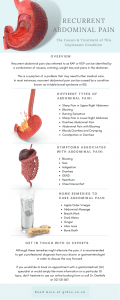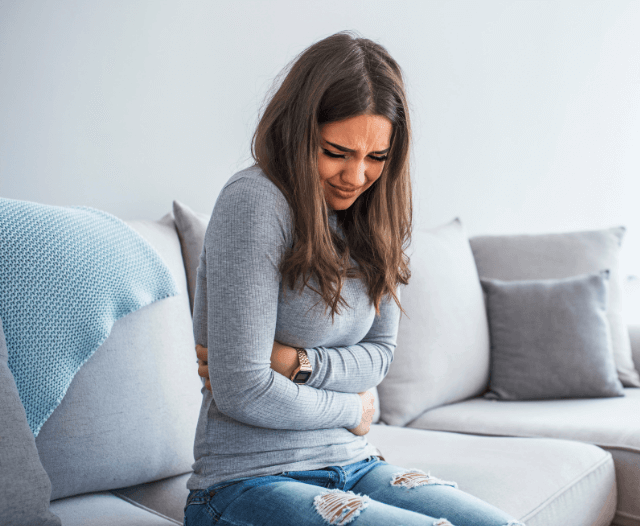What is Abdominal Pain
Recurrent abdominal pain also referred to as RAP or ROP can be identified by a combination of nausea, vomiting, weight loss and pains in the abdomen.
This is a symptom of a problem that may need further medical care.
In most instances, recurrent abdominal pain can be caused by a condition known as irritable bowel syndrome or IBS.
It is also possible to have RAP with different symptoms such as cramping and severe stomach aches.
It isn’t constant or agonizing to care for proper treatment, especially since pain might be alarming at first, however recurrent abdominal ache situations can fortunately be diagnosed and treated.
There is no need to suffer from frequent abdominal aches.
Let’s see how RAP can be caused, diagnosed and treated.
Main Causes of Abdominal Pain
The most common cause of abdominal pain is indigestion, or more specifically gastritis.
This occurs when the lining of the stomach becomes irritated from any number of ailments, including stress, overeating and consumption of certain foods.
Another reason for pain in the stomach area could be a hernia, which occurs when fat pushes through a weak point in your abdominal muscles.
Some other reasons that pain could occur in your gut include appendicitis and hepatitis, both of which are difficult to say without proper diagnosis.
If you’re experiencing any sort of discomfort in your abdomen you should see a doctor right away because these conditions can escalate quickly and lead to deadly consequences if left completely untreated.
Different Types / Variants of Abdominal Pain
When it comes to abdominal pain, there is no such thing as a one-size-fits-all solution.
That said, there are several different ways of tackling the issue of stomach pain.
The following is a rough overview of different variants of abdominal pain.
Ideally, it’s always worth going in for a proper medical examination in case things are more serious than you think.
- Sharp Pain in Upper Right Abdomen
- Bloating
- Burning Sensation or Upper Stomach Pain
- Sharp Pain in Lower Right Side of the Abdomen
- Diarrhea Abdominal Pain
- Abdominal Pain with Bloating
- Bloody Diarrhea and Cramping
- Bodily Discomfort with Constipation or Diarrhea
Symptoms Associated with Abdominal Pain
The way you feel when you have abdominal pains varies from person to person, but there are a few consistent symptoms that everyone can identify with.
Although it is not possible to get a diagnosis from the list of abdominal pain symptoms alone, these areas of concern should put people out of their misery by ruling out certain conditions.
However, it is important to remember that even though the pain appears localised to an area of the abdomen, they can still be caused by any organ within the body – not just the abdominal organs themselves.
Here are some of the symptoms associated with abdominal pain:
- Bloating
- Gas
- Indigestion
- Discomfort in the upper left or right; middle; or lower left or right abdomen
- Diarrhea
- GERD (gastro-esophageal reflux)
- Heartburn
- Chest discomfort
- Belching
- Constipation
- Pelvic discomfort
How to Diagnose and Treat Abdominal Pain
Abdominal pain is arguably the most common complaint among men and women, with women being more susceptible to one specific type of pain known as functional abdominal pain.
It’s an extremely unpleasant sensation that can be likened to severe menstrual cramping accompanied by bloating and nausea.
Men can express pain in different ways, such as gastroenteritis or irritable bowel syndrome (IBS), which indicates that they will need a different approach when diagnosing their problem.
It’s vital experts figure out what is exactly causing the abdomen pain so it can be treated efficiently and effectively.
The causes of abdominal pain vary broadly and therefore each case must be dealt with on its own terms through a thorough evaluation and proper diagnosis process.
Home Remedies to Cure Abdominal Pain
Some common home remedies to cure abdominal pain include:
Apple Cider Vinegar
Apple cider vinegar is a great natural remedy to many digestive problems. It helps to balance the acidity of the stomach, which we need in order to properly digest food.
Abdominal Massage
If you have been experiencing stomach pain and constipation, a gentle abdominal massage can help move things along and relieve the intestinal blockages that may be causing the stomach pain.
Gently massage this area with your forefinger and middle finger in a clockwise motion to stimulate muscle contractions and break up food that may be stuck in the intestines, due to overeating.
Breath Work
When you are stressed, your body enters a state of “fight or flight” – not “rest and digest”. This can make digestion difficult, which can lead to stomach-ache.
To help with digestion, take 3-5 deep breaths in and out before you sit down to eat. This will recentre your body and shift your focus to digesting food. If you start experiencing stomach-aches, try this trick before the meal starts!
Drink Water
Water is a key nutrient that helps hydrate the colon, speed up elimination and support the small intestine bacteria.
Drinking enough water daily can help prevent constipation and acid reflux. One way to remember to drink plenty of water is by downloading one of these free water-drinking apps.
Ginger
Ginger is a fantastic natural stimulant to digestion, like apple cider vinegar.
If you have fresh ginger in your house or can quickly go out to the grocery store to get some, break off about 1 centimeter of it and chew on it for a few minutes.
Aloe Juice
When you’re suffering from a sunburn, it’s common to turn to aloe. The plant has been used for centuries to soothe skin and heal wounds, but aloe can have a number of other benefits as well. One of those is that it can be soothing for the cells in your digestive tract.
Bone Broth
Bone broth is rich in both collagen and gelatine, which help to repair damage to cells.
If you eat a nutrient-poor diet, have a known digestive health condition, or have taken medications that may have compromised the integrity of the digestive tract, cellular damage may have occurred, and bone broth can be extremely healing. Here’s how to make your own.
Peppermint Essential Oil
The benefits of ginger and apple cider vinegar are well documented, and research suggests that peppermint oil offers similar benefits.
Peppermint oil is a great substitute for ginger or apple cider vinegar if these ingredients aren’t available due to illness or travel. It can also be used to treat muscle spasms in the stomach lining and colon.
Lemon Tea or Water
Lemons are another go-to for digestive health remedies. Lemons also help to entice proper digestive secretions to ensure your food is properly broken down and moving along in your system.
If your stomach isn’t feeling so great after a meal, make a hot lemon tea, or simply add 1 tbsp of lemon juice to a cup of water.
Summary
Although these remedies might alleviate the pain, it is recommended to get a professional diagnosis from your doctor or gastroenterologist in order to discuss the way forward.
If you would like to book an appointment with a gastrointestinal (GI) specialist or would simply like more information on a particular GI topic, don’t hesitate to use our online booking form or call Dr. Deetlefs at 021 551 867.
DISCLAIMER: PLEASE READ CAREFULLY
The information on this website is to provide general guidance. In no way does any of the information provided reflect definitive medical advice and self-diagnoses should not be made based on information obtained online. It is important to consult a Gastroenterologist or medical doctor regarding ANY and ALL symptoms or signs including, but not limited to: abdominal pain, haemorrhoids or anal / rectal bleeding as it may a sign of a serious illness or condition. A thorough consultation and examination should ALWAYS be performed for an accurate diagnosis and treatment plan. Be sure to call a physician or call our office today and schedule a consultation.
© Dr. Eduan Deetlefs, Registered Gastroenterologist, GI Doc Cape Town
Our website information is not intended or implied to be a substitute for professional medical advice, diagnosis or treatment. Please consult a doctor about your specific condition. Only a trained physician can determine an accurate diagnosis and proper treatment.







